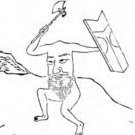-
Content count
1,423 -
Joined
-
Last visited
-
Days Won
18
-

Have anyone here been part of an esoteric society
SirPalomides replied to NaturaNaturans's topic in Agrippa Textual Study
For a long time, there were only two kinds of people admitted to the liturgy: catechumens (those formally enrolled into Christian instruction) and baptized. At a certain point in the liturgy, the deacon comes out and exclaims "Catechumens depart!" meaning that only the baptized can remain at the service. This exclamation can still be heard today in Eastern Orthodox liturgies, even though it is no longer enforced (at this point I once saw the priest's wife lean over to an actual catechumen and jokingly say "get out!"). This, together with "I will not speak of this mystery..." is related to the era of persecution but also the inherited understanding that it is unseemly to talk publicly about the mysteries. In ancient Greece where almost everyone had been initiated into the mysteries, people could still be prosecuted for discussing them publicly. Chrysostom is credited with writing the liturgy that bears his name but no one really knows the exact history of it. In any case Chrysostom was the bishop in Constantinople at a time when Christianity was pretty secure as the dominant faith; Germanus was writing even later when it was thoroughly entrenched and pagans had been thoroughly purged from public life. My overall point is that esotericism takes many forms. Some of it really involves a secret and closed circle of initiates but that is only one piece of the picture and various kinds of public esotericism are widespread and important features of religious life around the world. -

Matthew 10:34-36 - what does he mean?
SirPalomides replied to S:C's topic in Abrahamic Religions Discussion
Again, the context of the passage makes it clear what it's about. Of course esoteric readings about spiritual struggle, cutting through attachments, etc. can and have been made but they don't contradict the basic gist that he is bringing intracommunal conflict and it's not going to be pretty. -

Matthew 10:34-36 - what does he mean?
SirPalomides replied to S:C's topic in Abrahamic Religions Discussion
Well he pretty much lays it out in what he says before and after this line, that is, that his doctrine and following will produce dissension within communities and families and the persecution of the disciples. -
Emerging from the Mantak Chia retreat like
- 26 replies
-
- mantak chia
- sexual transmutation
-
(and 1 more)
Tagged with:
-

Full description of methods for the 4 stages of internal alchemy in book: Internal Alchemy for Everyone
SirPalomides replied to Yae's topic in Daoist Discussion
Believe what you like, I’m just telling you what the Chinese text says and how this arhat is described. There was zero polemic in what I said. -

Full description of methods for the 4 stages of internal alchemy in book: Internal Alchemy for Everyone
SirPalomides replied to Yae's topic in Daoist Discussion
The Sandalwood-Storehouse King is described as a king of Yuezhi, ie Kushan. For someone trying to get rid of his dick your attitude seems… prickly -
So I guess the artist definitely had the Master and Margarita in mind. It's interesting, I don't know of any country other than Russia where so many contemporary artists produce fine work comparable to academic painting and other 19th century styles. It's not like they're stuck in the past either, Russia has also contributed its fair share of avant garde art.
-

Full description of methods for the 4 stages of internal alchemy in book: Internal Alchemy for Everyone
SirPalomides replied to Yae's topic in Daoist Discussion
The Venerable Sandalwood-Storehouse King. 7th of the 500 arhats. He might be a mythologized version of the Kushan King Kanishka who is credited with protecting Buddhism in his kingdom, hence the Buddha in his bosom. -
According to the Records of the Snoring Goat there is a creature called the jibber-cat who lives in the western highlands whose head detaches in the moonlight and flies through the air, whispering into the ears of sleeping highwaymen. In the morning they awake and go robbing but they forego silk, gold, and jade, taking from the passersby only their stocks of salmon, carp, and milk. So it is with words.
-
This is very interesting! Has anyone else put forward a reading like this? If your reading is correct, it might line up with something I noticed about Zhuangzi- many people notice Zhuangzi's skeptical attitude toward conventional language, and stop there, without noticing his idea of "goblet words", his expansive idea of language, speaking non-speech, that can indeed harmonize with the flowing character of life.
-

Jesus in India ( Himalayas)
SirPalomides replied to Chang dao ling's topic in Abrahamic Religions Discussion
Plato predates Epicurus but we could probably see some of the arguments anticipated in the Republic. The one instance I’m aware of, of Platonists directly addressing Epicurean arguments against divine providence, is Plutarch’s very interesting essay On the Lateness of Divine Judgment. The problem of evil, its relation to matter, and other questions are given considerable attention by Plotinus, Iamblichus, Proclus, etc with varying solutions. The goodness of the Demiurge as assumed in the Timaeus is never in doubt but these thinkers are certainly attentive to the problems raised by the gnostics. I have a hunch the developed Platonic concept of the gods as impassive and effortlessly ordering the cosmos, showing neither favor nor wrath, arose partly in response to Epicurean theology though I’m sure they would indignantly deny this. -

Full description of methods for the 4 stages of internal alchemy in book: Internal Alchemy for Everyone
SirPalomides replied to Yae's topic in Daoist Discussion
Guys this whole discussion will be put to rest, and y’all will feel mighty silly, when @Yae comes back after 100-200 days looking like this -

Full description of methods for the 4 stages of internal alchemy in book: Internal Alchemy for Everyone
SirPalomides replied to Yae's topic in Daoist Discussion
I am. Thank you! -

Full description of methods for the 4 stages of internal alchemy in book: Internal Alchemy for Everyone
SirPalomides replied to Yae's topic in Daoist Discussion
Let us know how it works out for you. -

Have anyone here been part of an esoteric society
SirPalomides replied to NaturaNaturans's topic in Agrippa Textual Study
AMORC is just one of a constellation of organizations claiming the title of Rosicrucian. Again, considerable historical experience to contradict this. Esotericism is much too broad to pass definitive judgments about who is genuine or not.









